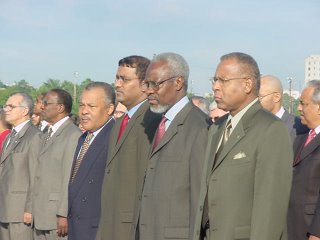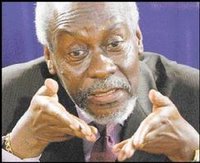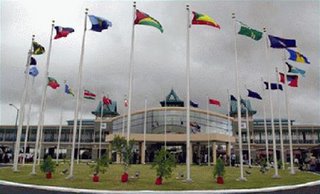It is patently clear that major players in the Americas (i.e., the U.S. Canada, Mexico and Venezuela) have little regard for the geopolitical concerns of the (individual) member states that comprise the Caribbean Community and Common Market (CARICOM); and, the governments of these former English colonies have only themselves to blame. Indeed, there could be no more dramatic demonstration of America’s disregard than the juxtaposition of last week’s gathering of CARICOM ministers in Freeport, Bahamas (to discuss urgent regional issues – like how to interdict Haitian refugees swarming their beaches everyday) with this week’s gathering of ministers from the Organisation of American States (OAS) in Fort Lauderdale, Florida (to discuss their most pressing concerns – like democratic reforms and free trade). After all, despite their solicitations, the US Secretary of State Dr Condoleezza Rice refused to meet with the CARICOM ministers in Freeport and has only deigned to give them a little time between her scheduled meetings at the OAS summit to plead their concerns.
Yet, with almost Pavlovian consistency, CARICOM leaders deflect blame for our marginalisation on American hegemony. And in Hugo Chavez they now have a putative colonial master who seems all too willing to provide political and economic shelter for them to continue wagging their tails in blissful isolation.
For their part, though diplomatic protocol precludes their saying so publicly, Bush Administration officials regard our leaders as impudent ingrates who are being marginalized for pursuing policies that are hostile to America’s interests; For example, by:
Undermining efforts by former US Secretary of State Colin Powell to resolve the recent political crisis in Haiti and even accusing the U.S. of orchestrating a coup d’etat against then President Bertrand Aristide;
Strengthening diplomatic and economic ties with perennial U.S. nemesis Cuba whilst accepting sweetheart investments from China in return for severing diplomatic ties with perennial U.S. ally Taiwan; and
Refusing to support the preferred U.S. candidate in the hotly contested election for a new leader of the OAS earlier this year.
 Leaders of the founding member states of CARICOM celebrating CARICOM-CUBA day and honoring their long-standing ties with Fidel Castro – the bane of US presidencies for almost 50 years. (Left to right: Owen Arthur of Barbados, Bharrat Jagdeo of Guyana, P.J. Patterson of Jamaica and Patrick Manning of Trinidad and Tobago)
Leaders of the founding member states of CARICOM celebrating CARICOM-CUBA day and honoring their long-standing ties with Fidel Castro – the bane of US presidencies for almost 50 years. (Left to right: Owen Arthur of Barbados, Bharrat Jagdeo of Guyana, P.J. Patterson of Jamaica and Patrick Manning of Trinidad and Tobago)
But, whatever the merit of these policies, CARICOM leaders have not inspired much regard for (or confidence in) their authority by proving almost as feckless as African leaders in dealing with regional problems (particularly the thriving blights of drug trafficking and Haitian immigration). Moreover, despite legitimate complaints about America’s arbitrary and capricious exercise of its super power, internecine squabbles amongst CARICOM members are primarily responsible for our marginalisation.
Indeed, our failure to integrate our economies after 47 years of negotiations stands as a monumental and unprecedented achievement in political futility. And, this failure is all the more pathetic when one considers that CARICOM leaders have allowed the common heritage and economic challenges that bind us to be perverted into the divisive xenophobia and rabid nationalism that once characterized the warring nation-states of old Europe.
 CARICOM flag seeking a bona fide CARICOM entity to represent…
CARICOM flag seeking a bona fide CARICOM entity to represent…
Meanwhile, the vastly more diverse and populous countries of the Americas are negotiating their way through seemingly intractable issues to integrate their economies. (See NAFTA & CAFTA) And it is instructive that even as he rails against NAFTA, CAFTA & FTAA, Chavez delights in the influence he wields amongst the integrated economies of South America (i.e., the South American Community of Nations [SACN]). Then, of course, there’s the EU, where – notwithstanding dramatic setbacks in ratifying their constitution, the countries of Europe remain the world’s standard bearers for integrating regional economies.
(Indeed, it’s worth noting here that the defeat of the EU Constitution does vitiate the enduring viability of the Maastricht Treaty which continues to bind the economies of Europe to what may prove the greatest extent possible – consistent with the inviolable expectations of national sovereignty.)
Yet, the Caribbean Single Market Economy (CSME) looms as the most recent missed opportunity for CARICOM Heads of State to integrate our economies. CSME mirrors the European Maastricht Treaty in calling for the harmonization of fiscal policy and a single currency; the free movement of people, goods, services, labour, capital and technology; a common external tariff; and a Caribbean Court of Justice (CCJ) to replace the British Privy Council as the highest court of appeal in the Caribbean. Yet, even with this clear path to integration, CARICOM members have continually erected road blocks to impede implementation of CSME provisions.
It is really uncanny and profoundly dispiriting to see CARICOM members beset by regional conflicts which also mirror lingering European conflicts. For example, some members accuse the Bahamians of acting like the English in their refusal to endorse some of the central provisions of the Treaty of Chaguaramas (which established CARICOM); just as England has refused to endorse the Euro, and is even more opposed than the Dutch and French are to ratifying the EU Constitution.
Alternatively, some members accuse the Jamaicans of acting like the French – as if they are first amongst equals in CARICOM. These countries (especially The Bahamas) see Jamaica’s presumptive leadership within the organization as anathema to their national interests; just as England clearly regards the presumptive leadership of France as contrary to their interests within the EU.
 PM Patterson of Jamaica doing his best to emulate the Gaullic pleadings of French President Jacque Chirac as he makes his case for ratifying the Treaty Chaguaramas…
PM Patterson of Jamaica doing his best to emulate the Gaullic pleadings of French President Jacque Chirac as he makes his case for ratifying the Treaty Chaguaramas…
But on
e has to wonder what hope remains for regional integration given that, only months ago, Acting PM Cynthia Pratt of The Bahamas expressed her government’s substantive reservations to joining the CSME regime as follows:
We do not intend to damage employment and career prospects of Bahamians by opening up our borders. We do not intend to undermine our legal system by removing the recourse to the Privy Council….We do not intend to undermine the strength of the Bahamian dollar by joining with currencies, which are so much weaker….Because if we are expected to seriously damage our own interest in support of a regional initiative, which is of no benefit to us, we will simply stand back in our involvement in the Caribbean.
This then prompted PM Patterson of Jamaica, no doubt asserting his presumed regional authority, to declare that the reservations sought by The Bahamas are untenable and tantamount to a rejection of the entire Treaty. And he is absolutely right! In fact, the approach of The Bahamas towards CARICOM is nothing short of arrogant, self-interested, unsustainable and, ultimately, self defeating. After all, compromise is the indispensable ingredient for creating an effective CSME, and no country can be allowed to reserve compliance with any provision of the Treaty to suit its perceived national interest.
Alas, together Caribbean countries shall stand or divided they shall fall. Meanwhile, they should be mindful of the devastating consequences that befell the (banana producing) economies of St. Vincent, Dominica and St. Lucia; because they did not have the economies of scale – that CSME would provide – to give them a fighting chance in defending their market share during the recent banana trade war against the U.S. and Central America.
And, it’s only a matter of time before The Bahamas confronts the geopolitical realisation that no country is an island unto itself, and that the economic and political leverage that comes with regional integration provides the only means for small countries to further national interests in a global economy dominated by regional blocs. After all, it defies commonsense for a country of less than 400,000 people to presume that it can fare better in negotiations with regional groups representing hundreds of millions of people (like CAFTA, NAFTA or the EU) than it can as a full member of CARICOM and CSME.
Therefore, the only enlightened course for CARICOM members to pursue is to put their national interests into proper perspective, ratify the CSME and, as a bloc, be prepared to negotiate the best terms for entry into the Free Trade Area of the Americas (FTAA) that will be the next inevitable step, after CAFTA, towards full economic integration of the Americas.
 Picture of CARICOM Headquarters in Guyana taken, symbolically, under gathering black clouds…
Picture of CARICOM Headquarters in Guyana taken, symbolically, under gathering black clouds…
Good luck!
News and Politics
Anonymous says
I always knew they were laid back in the islands. But 50 years on this is ridiculous. I see youre a black lawyer so maybe they won’t call you racist for telling it like it is.
Anonymous says
blacks are their own worst enemies in the caribbean and in africa. they prefer to fight each other for handouts instead of organizing themselves and fighting as one. lets face it, whether they are white europeans, white americans or white latinos none of them really want to deal with black people. but if we have collective power, then they will have to. its the only way my brothers!